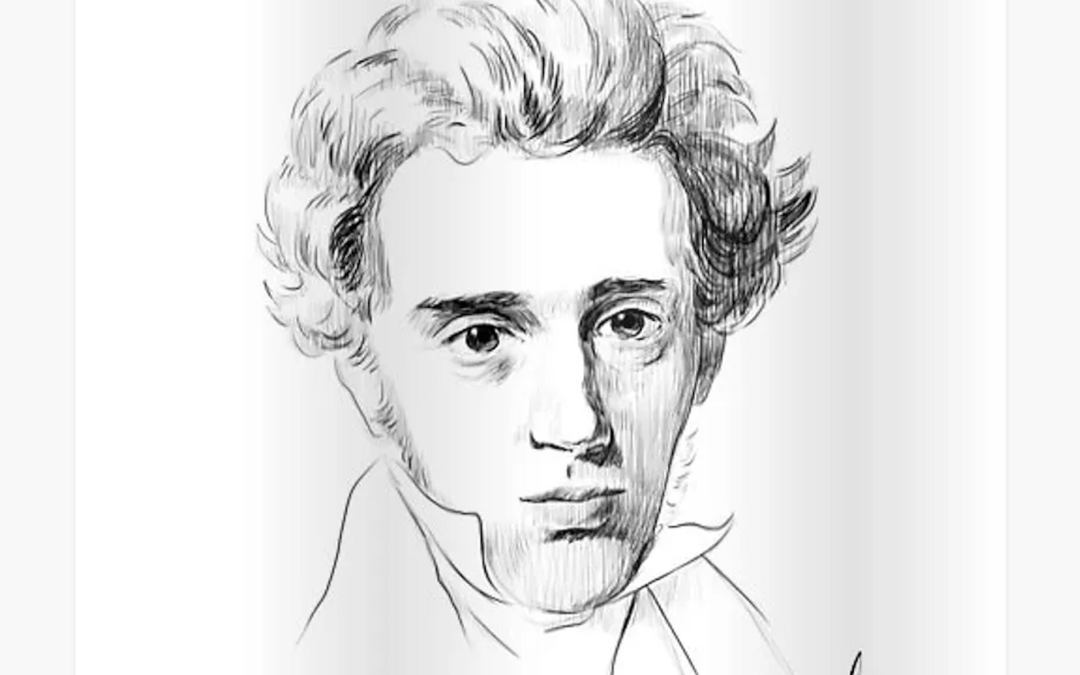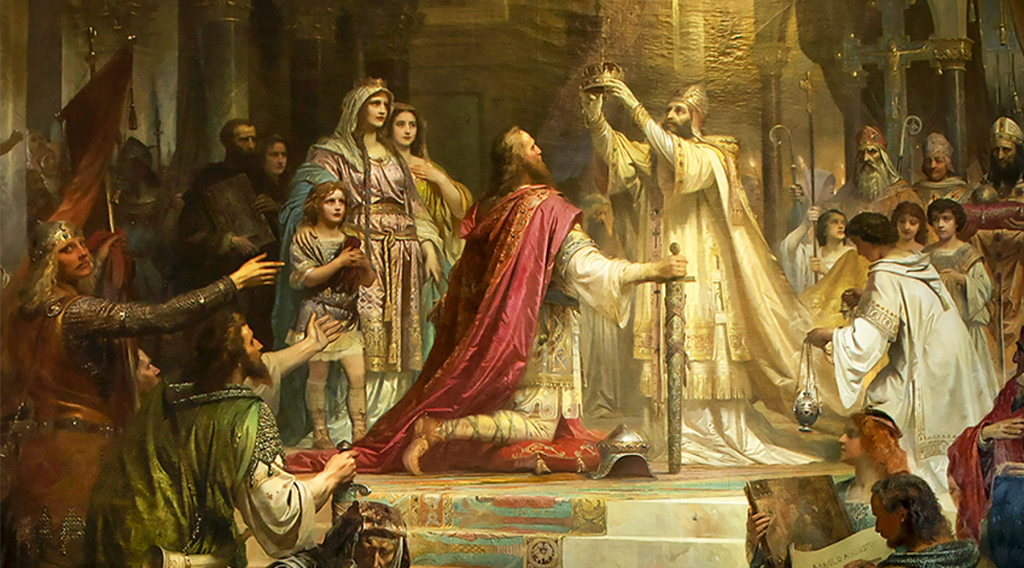
What is Faith?
Seems like a simple question, right? Especially because everyone, Christian or not, seems to think they know the answer. I’ll get to that and what I think it means, but the inspiration for this post comes from the 19th century Danish Christian philosopher and writer Søren Kierkegaard (1813–1855), often considered the father of existentialism. I’m reading one of his books, Fear and Trembling, and it’s mostly inscrutable to me. Dude thinks way too much. No wonder he’s considered one of the founders of modern existentialism, a navel-gazing philosophy that broods on the conundrum of existence while being immersed in subjective emotions and thought. In the book Kierkegaard uses the word faith a lot, but never bothers to define it, and I’m sure most readers of Kierkegaard never question what it means either.
This word and the question is important to me because in a way it was the inspiration for my first book, The Persuasive Christian Parent. I read an article in 2015 by a young woman who grew up in a solid Christian home, was involved in her church’s youth ministry, went off to college and promptly abandoned Christianity, becoming, as she writes, an agnostic. This ticked me off because I believed that would never happen to my children. I taught them all their lives that we believe in Christianity because it’s the truth, and that’s the only reason. The truth of Christianity, or not, didn’t seem to occur to this newly minted agnostic, that maybe truth is the only issue that matters, not how she feels. I was going to write a blog post, but then thought, why not write a book! I wanted to figure out exactly how I worked to ground my kid’s in their faith so they would never consider leaving it, and as adults they haven’t.
As you can see from the last sentence, the word faith can have different meanings based on how it’s used. Faith in that context is a synonym for Christianity. In another context If I say, “You just have to have faith,” we’re not quite sure what it means; faith in what? If it’s to an athlete, the person is being exhorted to believe in, to trust, their talents or abilities or training or experience, whatever it is that made them a winner in the past. The person using the word has in mind what it means, and assumes others share that meaning. That gets to the heart of the issue, as we’ll see. In fact, at dictionary.com there are seven definitions of the word, one of which is why I wrote the book—belief that is not based on proof. In our secular age, most people using the word in a religious context use it this way, even some Christians. This is convenient for atheists and agnostics, like the young lady above. I can guarantee that she was under the impression she left something that required “faith,” Christianity, for something that did not, agnosticism, not realizing she was simply leaving one “faith” for another. And that, as we’ll see, is the issue.
It All Comes Down to Epistemology
This word, which few people know, is the philosophical study (ology) of knowing (epistēmē in Greek). Philosophers have debated what we can know, or not, since antiquity. That’s a long time to debate knowing! It seems like a simple concept, right? I either know or I don’t. Not so fast. Think about when your Uncle Bob the skeptic comes over for Thanksgiving and asks, “How do you know that?” to everything you say, he’s basically saying we can ’t know anything at all. That is called skepticism, the idea that knowledge or knowing is not possible. Everything is basically guesswork and speculation. It appears humble on the surface, but it contradicts itself. If I say I can’t know anything at all, how do I know that? I’m asserting I can know that I know that. It violates the first law of logic, the law of non-contradiction, something all of us should have learned in middle school, but alas haven’t. The father of logic, Aristotle, taught us that A cannot be non-A. For example, “It is raining and it is not raining” can’t be true. It contradicts itself. So, skepticism can’t be true, ergo (therefore), we can know. Even though there were skeptic philosophers in the ancient world, it’s become especially problematic in the modern world. Why is that? Descartes, of course.
If you’re familiar with my work, this won’t surprise you at all. I’m sure at this point you’re tired of my blaming Descartes for everything. The reason this 17th century French philosopher is the father of skepticism is because of his search for absolute certainty, and his assumption it could be attained. Big, huge, mistake. He began his search doubting everything he could doubt, and found the only thing he couldn’t doubt was himself; he concluded, I think therefore I am, cogito ergo sum in Latin. Thus began rationalism, the idea that our knowing is possible by reason alone, God and revelation not required. As a pious Catholic he didn’t reject revelation, but the rationalism he inspired most definitely did.
This birthed what we know as the Enlightenment, and that ruined everything. I always overstate that because it wasn’t all bad, just mostly bad, especially because it gave rise to secularism, or that it was possible to run a society without God. Scottish Philosopher David Hume (1711-1776) took rationalism to its logical conclusion by proving there can be no knowledge of anything beyond experience, what is called empiricism. Experience, Hume argued, can’t know anything outside of itself, so knowing is not possible. If you start with self, self is all you got. He found it depressing that skepticism was inevitable, and given he was not religious, revelation was not an option. Sadly, Descartes and Hume, with a dash of Kant, Hegel, Marx, Darwin, Nietzsche and Freud thrown in, is the depressing dead end worldview of modern man.
Hume was probably agnostic but was a functional atheist, which was controversial in his day. In fact, he was rejected as the chair of philosophy at the University of Glasgow due to his religious views. His contemporary, French philosopher Voltaire (1694-1778), was likely the one who make who made atheism culturally palatable in the West. His poem on the great Lisbon earthquake in 1755 that killed upwards of 40,000 people was the first work in Christian history to put God in the dock, on the stand as we now say. To his questions, we or God can offer no answers:
Will ye reply: “You do but illustrate
The iron laws that chain the will of God”?
Say ye, o’er that yet quivering mass of flesh:
“God is avenged: the wage of sin is death”?
What crime, what sin, had those young hearts conceived
That lie, bleeding and torn, on mother’s breast?
Did fallen Lisbon deeper drink of vice
Than London, Paris, or sunlit Madrid?
The growth of atheism was what turned faith into a question because as this movement of rejecting God grew throughout the 19th century and into the 20th, atheists assumed they were rejecting faith. It was only “religious” people who required faith, which came to be defined as belief without evidence. When the so-called New Atheists exploded on the scene in the first decade of this century, these twin ideas of religious people requiring faith, and faith defined as belief without evidence, became their mantra. To them it was axiomatic that since they didn’t believe in God, they didn’t need faith, but all human beings live by faith.
There is No Such Thing as an Unbeliever
Only the most hardcore arrogant atheists will make that argument today. It’s too obvious to even mention that if someone doesn’t believe in God that itself is a belief, but since Voltaire it was assumed atheists had no need for faith. I’m sure I’ve known this all my Christian life, but when I came across a book with the title, I Don’t Have Enough Faith to be an Atheist, I realized just how much faith is required to believe there is no God. Talk about a leap of faith! Yet, most people, Christians included, persist in identifying people as believers or unbelievers. The word believers referring to Christians is common in the New Testament, but everyone then and since knows this refers to Christians. In our secular age, the word believer, or unbeliever, is problematic because it allows secular, irreligious people to think belief or faith is something only religious people need, but they don’t. But secular people are every bit as religious as Christians; only the object of their faith is different—everyone lives by faith.
What do I mean when I say everyone lives by faith? Again it comes down to epistemology, and the nature of our knowing. Some years ago I took a trip to where I was born and raised in southern California to see family and friends, and I got into interesting conversations with two friends who are self-described agnostics. Many Christians would describe them an unbelievers. I realized something as I thought back on these conversations. My interlocutors believed they couldn’t know the religious stuff I was talking about with any certainty, so I sensed they think why bother with it at all. Their objection to Christianity is rooted in epistemology! They probably wouldn’t even know the word, but there it is, nonetheless.
Most people assume knowledge is limited to what is empirically verifiable, or empiricism. It seems obvious to them that what we can see, feel, taste, touch, and hear is more knowable than that which is not available to our five senses. Scientism, that the only valid knowledge comes through the scientific method, and skepticism, are based on such assumptions. In this context you can understand why such people would think faith is believing without evidence, that faith is a religious construct, and doesn’t apply to the atheist or agnostic. This mentality, and it is widespread, is the fruit of secularism, the notion that life at its most basic level is irreligious. People tend to assume there are basically two ways to live. Some people are religious, and others are not religious, and never shall the two meet. In fact, they are the same person! Every person is religious because every person lives by faith because every person is finite, limited in every way imaginable. Faith is required for human beings to exist. What do I mean by that?
The word finite defines everything about us. Our ability to know is limited because we are limited, and these limits of our knowledge apply to everything. That doesn’t mean we can’t know, can’t have real knowledge, justified true belief as the philosopher’s would say, but that we can only know so much. Faith is that which fills in the gaps in our knowledge. The examples are pretty much endless because we use faith continuously just to exist without going crazy. One of these happened just this morning as I write. I saw a hot air balloon not far from our house, which is faith in action. Does that person know the air pumped out by the flames will continue to keep the balloon afloat? Of course not! But he has good reason to believe it will because it has before. Faith, therefore, is trust based on adequate evidence. Trust fills in the knowledge gap, if you will. How as Christians should we think about knowledge and knowing?
The Bible and Knowing
The case for knowing is easy to make biblically. A word search at Biblegateway. com shows that know and its variations is used upwards of 1,200 or 1,300 times in the Bible. The idea that knowledge is problematic for human beings is foreign to the biblical worldview. And we can have confidence that our knowing is rooted in what is actually there, or the real.
Next we must connect our understanding of epistemology to anthropology, our understanding of man (anthropos in Greek) or human nature. For the Christian this is critical. Man, male and female, was created as Genesis 1 tells us, “very good.” God is emphatic on this point. In the account of creation God declares six times that his handiwork is “good,” and tops it off declaring it all “very good” only after he created man. But something happened that marred that goodness; we call it the Fall. It was at this point that knowing became problematic for the human race.
The Bible, however, never stops affirming the possibility of knowing and knowledge, but as Paul said, “now we see through a glass, darkly” (I Cor. 13:12, KJV). Our knowing like everything else is marred by sin. We call this total depravity, which doesn’t mean God’s image in us is totally corrupted, but that every part of our being is tainted by sin. We are at once noble and disfigured. Good and evil comingle in our being, and who is not aware of that regardless of what they believe. Sixteenth century Reformer John Calvin speaking of the Apostle Paul’s understanding of sin asserts:
that the corruption subsists not in one part only, but that none of the soul remains pure or untouched by that moral disease. For in his discussion of a corrupt nature Paul not only condemns the inordinate impulses of the appetites that are seen, but especially contends the mind is given over to blindness and the heart to depravity.
Our fallen state is cause for epistemological humility, a phrase I am extremely fond of. While our knowing is real, it is limited by our sinful nature and our finitude, but on biblical presuppositions there is no justification for skepticism. We can know things because we are created in God’s image in God’s world. Calvin further makes the point that skepticism is not warranted:
[W]e see implanted in human nature some sort of desire to search out the truth to which man would not at all aspire if he had not already savored it. Human understanding then possesses some power of perception, since it is by nature captivated by love of truth.
Seventeenth century mathematician, physicist, and Christian apologist Blaise Pascal put similar thoughts in a much more poetic way:
What kind of freak is man? What a novelty he is, how absurd he is, how chaotic and what a mass of contradictions, and yet what a prodigy! He is judge of all things, yet a feeble worm. He is repository of truth, and yet sinks into such doubt and error. He is the glory and the scum of the universe!
A biblical anthropology is consistent with what we experience of human nature. All of us, if we are honest, can see Dr. Jekyll and Mr. Hyde in even the best human being, but especially in ourselves. Even though we are fallen, however, God has made it possible that we can have significant confidence in the knowledge we possess, even though such confidence is never absolute. Thus the necessity of humility and faith to fill in our knowledge gaps.
Reason Isn’t Enough
The second poison Descartes and the Enlightenment gave us after a presumption of absolute certainty, is that reason is the only means of knowing, as if knowing could be reduced to the laws of logic. That would be like thinking human beings can experience the world with only one of their five senses. Os Guiness in his book, In Two Minds: The Dilemma of Doubt & How to Resolve It explains the helpful idea of limits:
Christianity is second to none in the place it gives to reason, but it is also second to none in keeping reason in its place. We never know the value of a thing until we know it’s limits. Put unlimited value on something and in the end you will exhaust it of all value. If we forget the limits of a thing, we fly in the face of reality and condemn ourselves to learn this simple ironic lesson: More without limits is less; less with limits is more.
Reason by itself, without revelation, is something like colorblindness. It can learn, apprehend, and know things, but it can never fully define these for what they are because only in Christ do all things hold together (Col. 1:17). This makes more sense if we think of universals and particulars, puzzles and puzzle pieces. Without God in Christ, who is the ultimate universal, no particular can be defined in its fullness, for what God created it to be, its telos, or purpose. To truly know even in our limited fashion, we need to have the ultimate puzzle picture, the biggest of big pictures that gives meaning to it all.
Much of what we “know” is not the result of some kind of logical process, a syllogism, or rigorous inductive reasoning. What we “know” can’t be proved in the final analysis. Rather what we “know” must be accepted by faith, which is warranted trust based on what we consider adequate evidence. When we get right down to it, faith, and the acceptance of its inevitability in life, is to pay homage to our finitude. But human beings are not fond of admitting their limits.
This refusal to accept our created nature makes perfect sense in light of what we read in Genesis 1‑3. We learn that our Creator is God and that we are not (shocking to some, I know). Our fall from our esteemed created state was instigated by the temptation of wanting to be like God, to usurp His place as the one who defines reality. The insistence that we ought to have absolute certainty and that we can reason our way to perfect knowledge, is an indication that we are by nature rebels who refuse to accept that we are contingent created beings. We are dependent on God, as the Apostle Paul told the Greek philosophers in Acts 17, for life, breath, and everything else. That pretty much covers it all! Therefore, go and live by faith.




Recent Comments